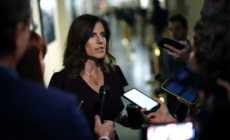-
Chinese citizen allegedly photographed Vandenberg base with drone - 13 mins ago
-
UN General Assembly Approves Resolution Demanding Immediate Gaza Ceasefire - 17 mins ago
-
Hannah Kobayashi Is ‘Found Safe,’ Weeks After She Was Reported Missing - 19 mins ago
-
‘American Psycho’ Remake’s Austin Butler News Has Fans Out For Blood - 53 mins ago
-
Duo arrested in Woodland Hills doctor’s killing had troubled pasts - 54 mins ago
-
North Carolina G.O.P. Brushes Aside Democratic Governor to Expand Power - about 1 hour ago
-
Elton John Reveals Marijuana Stance - about 1 hour ago
-
Sen. Padilla to Biden: protect immigrants before Trump takes office - 2 hours ago
-
Man Who Leaped Over Bench to Attack Nevada Judge Gets Decades in Prison - 2 hours ago
-
Eyewitnesses Say Nancy Mace Called For Man’s Arrest After He Shook Her Hand - 2 hours ago
Republicans Like Joe Biden Less Than Bashar-al-Assad
It’s no surprise that President Joe Biden is largely unpopular among Republicans, but new polling data suggests his favorability is lower than that of some of the world’s most controversial figures, including the recently deposed Syrian President Bashar al-Assad.
According to a recent Economist/YouGov poll, conducted from December 8 to 10 with 1,593 U.S. adults, a stark contrast in favorability ratings was found between Biden and Assad among Republican respondents.
The poll revealed that only 11 percent of Republicans view Biden favorably, compared to 14 percent who have a favorable view of Assad. Meanwhile, 85 percent of Republicans hold an unfavorable view of Biden, compared to just 40 percent for Assad. Notably, nearly half of Republican respondents—48 percent—said they were unsure how to rate Assad.
While Biden’s low favorability among Republicans is not new, the comparison to Assad underscores the depth of the president’s unpopularity within this key voting bloc as his term nears its end.
The poll also showed that Biden’s overall favorability among U.S. adults is 38 percent, with 57 percent viewing him unfavorably.
A broader look at public figures reveals that Biden’s favorability also trails behind high-profile figures like Elon Musk, Mark Zuckerberg, and Donald Trump.
Shifting focus to Syria, the Assad family’s half-century rule crumbled with astonishing speed after insurgents burst out of a rebel-held enclave and converged on the capital, Damascus, capturing city after city in a matter of days.
The rapid advance of opposition forces left little resistance from the Syrian army, which disintegrated as the rebels moved into Damascus. President Bashar al-Assad, Syria’s ruler for 24 years—following the reign of his father, Hafez al-Assad—fled the country. Russian state media later reported that he was in Moscow.
In the short period following Assad’s abrupt fall, rebel leader Ahmad al-Sharaa, formerly known as Abu Mohammed al-Golani, has sought to reassure Syrians that the group he leads—Hayat Tahrir al-Sham (HTS)—does not seek to dominate the country and will continue government services. He has spoken of setting up a decentralized governance system.
Government officials who remained in Damascus as Assad fled—including Prime Minister Mohammed Ghazi Jalali—have met with the rebels to discuss the transfer of power.

Getty Images
So far, civil peace seems to be holding. The insurgents have appeared disciplined, working to maintain order, with no sign of reprisals.
Despite this, the U.S. and its partners aim to ensure that the Islamic State (IS) group, which still has a presence in Syria, cannot exploit the leadership void and once again exert control over wide swaths of the country. Pentagon spokeswoman Sabrina Singh said Monday that the U.S. struck about 75 IS targets in the Syrian desert on Sunday.
Source link


















